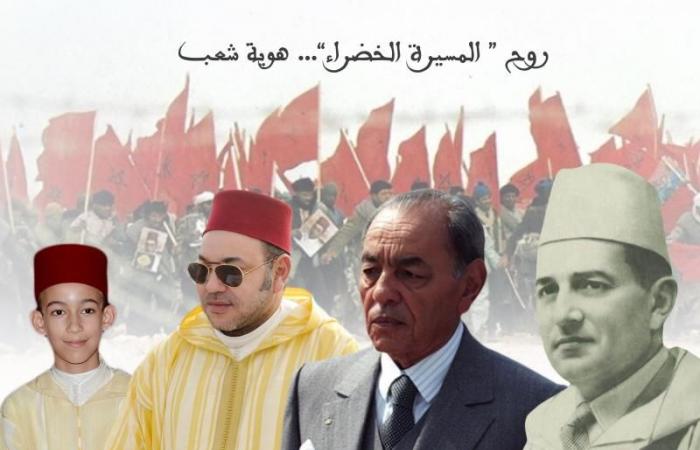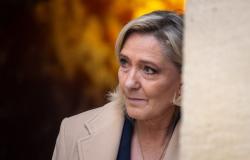On November 6 of every year, the Kingdom of Morocco celebrates the anniversary of the Green March, that historical moment that lit up the nation’s skies and opened new horizons for the recovery of the southern provinces. It is an occasion in which we invoke the spirit of national unity and cohesion between the throne and the people, and in which we recall prominent historical stations since the era of the late King Hassan II, who created the idea of this march, all the way to the era of King Mohammed VI, who continues to work to strengthen national sovereignty.
Symbol of national unity and solidarity
The Green March was and remains a symbol of national unity and solidarity that resulted in Morocco’s annexation of the Moroccan Sahara, which contributed to strengthening national identity. That moment embodied the spirit of solidarity and cohesion and expressed the strength of the popular will in facing challenges. The importance of this event is highlighted in renewing national awareness and strengthening belonging to Morocco. The march was not just a passing event, but rather a starting point for the formation of national policies, as it contributed to uniting the Moroccan people around the Sahara issue and emphasized the necessity of preserving territorial integrity.
Political and diplomatic challenges
Since the launch of the Green March in 1975, Morocco has faced major political and diplomatic challenges, with this issue forming a major focus in regional and international relations. Algeria, a supporter of the Polisario Front, played a major role in strengthening the anti-Moroccan position, providing military and financial support to the Front and exploiting the platforms of international organizations such as the African Union to promote its position, which negatively affected Morocco’s efforts to restore its sovereignty.
Spain, as a former colonial power, tried to preserve its historical interests in the region, and was not limited to hesitation in recognizing the Moroccanity of the Sahara, but rather opened diplomatic channels with the Polisario, which further complicated the situation. These political dynamics made it difficult for Morocco to strengthen its position in the international arena and presented challenges to its diplomatic strategies.
Multidimensional diplomatic strategies
Over time, there were continuous attempts by some European countries to undermine Morocco’s position, which required it to intensify its diplomatic efforts to strengthen its alliances with other countries, especially in Africa and Latin America. Under these complex circumstances, it has become necessary for Morocco to adopt multidimensional strategies that include active diplomacy and strengthening bilateral relations with major powers.
This was embodied in opening channels of dialogue with many countries, which helped gain international support for his position. For example, relations with the United States, France, and other countries were strengthened, as Morocco concluded a military cooperation agreement with the United States in 2004, which contributed to strengthening the strategic partnership between the two countries.
The reign of Mohammed VI: strengthening national sovereignty
Since King Mohammed VI assumed the throne in 1999, Morocco has continued to strengthen its diplomatic strategies and improve its relations with Arab and African countries. In recent years, the Sahara issue has witnessed a notable shift in international positions, with Morocco receiving increasing support from countries such as the United States, which recognized the Moroccan status of the Sahara in 2020.
These efforts reflect Morocco’s strong will to confront challenges and strengthen its international support for its initiatives, reflecting its firm commitment to achieving stability and development in the region. Morocco also marketed the autonomy plan as a realistic and practical solution to the conflict, which was presented in 2007, and many countries considered it the most serious basis for resolving the conflict, which strengthened Morocco’s position in international forums.
Economic and social challenges
The southern provinces of Morocco faced multiple economic and social challenges such as poverty, unemployment, and poor infrastructure, which had a significant impact on social stability and national identity. In response to these circumstances, Morocco has made huge investments in infrastructure development, implementing important projects including the construction of modern roads, ports and schools, which has contributed to improving the quality of life for the population. For example, the port of Dakhla was developed into a vital economic gateway, enhancing the region’s ability to attract investments and improve living conditions.
In addition, Morocco worked to encourage local initiatives and support small and medium enterprises, which contributed to creating new job opportunities and strengthening national belonging. The Human Development Initiative program was launched, aiming to improve the standard of living in remote areas, funding projects aimed at strengthening local capacities and providing basic services. Emphasis was also placed on education and vocational training, which helped young people acquire the skills necessary to enter the labor market. These efforts reflect Morocco’s commitment to achieving sustainable development and enhancing social stability in the southern regions, which contributes to building a better future for future generations.
Positive developments in the southern regions
In recent years, the southern provinces of Morocco have witnessed notable positive developments on several levels. The Moroccan authorities succeeded in maintaining security stability, which contributed significantly to enhancing confidence among the population, as this stability became an essential pillar for attracting investments and achieving sustainable development.
In addition, the southern provinces witnessed a significant increase in foreign investments, which contributed to the development of vital sectors such as renewable energy and tourism. These investments not only created job opportunities, but also helped strengthen infrastructure and improve the quality of local services.
Emphasis was also placed on developing environmental and cultural tourism, which gave local residents the opportunity to benefit from their natural wealth and rich history. These dynamics reflect Morocco’s commitment to promoting comprehensive and sustainable development in the southern provinces, which contributes to building a prosperous future for future generations.
New diplomatic successes
Without ignoring the latest developments, Morocco has achieved remarkable success in signing several international agreements that strengthen its position on the Sahara issue. Morocco has reached trade agreements with the United States that included recognition of the Moroccan Sahara, which reflects strong support from Washington and strengthens the Kingdom’s position on the international scene.
Moreover, Morocco has strengthened its partnerships with African countries, opening consulates in the southern provinces, which indicates the increasing support from African countries for Morocco’s position. These steps reflect Morocco’s commitment to strengthening regional cooperation and deepening ties with its neighbors.
Morocco has also been active in international and regional organizations such as the African Union, which has helped strengthen its legal and political position. Through these activities, Morocco was able to expand its circle of international support, which contributes to strengthening its stability and regional sovereignty. These developments reflect a clear strategic vision aimed at strengthening Morocco’s position in the international arena and enhancing its stability and sustainability.
The Green March: A Lesson for Future Generations
The Green March is more than just a historical event; It is a symbol of the national spirit that resides in the hearts of Moroccans, reflects the values of unity and solidarity, and enhances national belonging in the face of challenges. The march is an invitation to reflect on the importance of collective action and cohesion among the various components of Moroccan society to defend their rights and interests. It also highlights the ability of Moroccans to confront difficulties, making it a continuing lesson for future generations in patriotism and sacrifice.
On the anniversary of the Green March, we renew our pledge to fulfill our national principles. The recovery of the southern regions is a historical achievement and an ongoing path that requires commitment and cooperation to achieve development and prosperity. Under the leadership of King Mohammed VI, we are working together to strengthen national unity and support autonomy proposals that have received international acclaim. This anniversary calls on us to continue to strengthen the spirit of solidarity and belonging to our dear homeland, and to build a bright future characterized by stability and prosperity for all.
In conclusion, the Green March remains a milestone in the modern history of Morocco, embodying the determination of the Moroccan people and their strong will to defend their territorial integrity and legitimate rights. This historic event is not just a memory, but rather a continuing call to all Moroccans to stand in solidarity and work for a future characterized by sustainable development and comprehensive prosperity.






